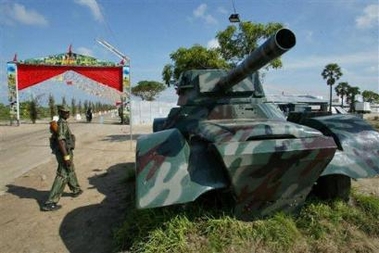|
Top Sri Lanka rebel issues ultimatum
(AP)
Updated: 2005-11-28 09:05
Sri Lanka's top rebel leader issued an ultimatum to the country's new
government on Sunday: address the grievances of the Tamil minority or face a
renewed struggle for independence.
Velupillai Prabhakaran, head of the Tamil Tigers rebel group, said President
Mahinda Rajapakse must propose a framework that satisfies the political
aspirations of the country's 3.2 million ethnic Tamils, who seek a separate
homeland in the northeast.
He did not set a date for the government's response.
"If the new government rejects our urgent appeal, we will, next year, in
solidarity with our people, intensify our struggle for self-determination, our
struggle for national liberation to establish self-government in our homeland,"
Prabhakaran said during his annual speech on the day the Tigers pay homage to
guerillas killed in fighting.

A Tamil rebel of the Liberation Tigers of
Tamil Eelam walks past a abandoned, repainted battle tank at the rebel
controlled town of Elephant Pass, about 270 kilometers (169 miles) north
of Colombo, Sri Lanka, Sunday, Nov. 27, 2005.
[AP] | There was no immediate government reaction, but Sri Lanka's top military
general said troops were ready to defend the country.
"We are always committed to the cease-fire but if they withdraw and attack us
we are not going to just sit and watch. We are going to retaliate," Lt. Gen.
Shantha Kottegoda told The Associated Press.
Prabhakaran said the patience of his people was running out.
"Our people have lost patience, hope and reached the brink of utter
frustration," he said.
His speech came two days after Rajapakse rejected rebel demands for a
homeland and promised to overhaul a 2002 cease-fire to curb violence and child
recruitment by the Tigers. The conservative leader, voted into office this
month, also vowed to revive stalled peace talks with the rebels.
More than 65,000 people were killed in nearly two decades of fighting before
the cease-fire was reached. Peace talks following the truce broke down in April
2003 over rebel demands for greater autonomy in the Tamil-majority northeast.
The uneasy cease-fire continues despite frequent violence.
The Tigers rebelled in 1983 over discrimination against Tamils, a largely
Hindu minority, by the predominantly Buddhist Sinhalese, the majority of Sri
Lanka's 19 million people.
|